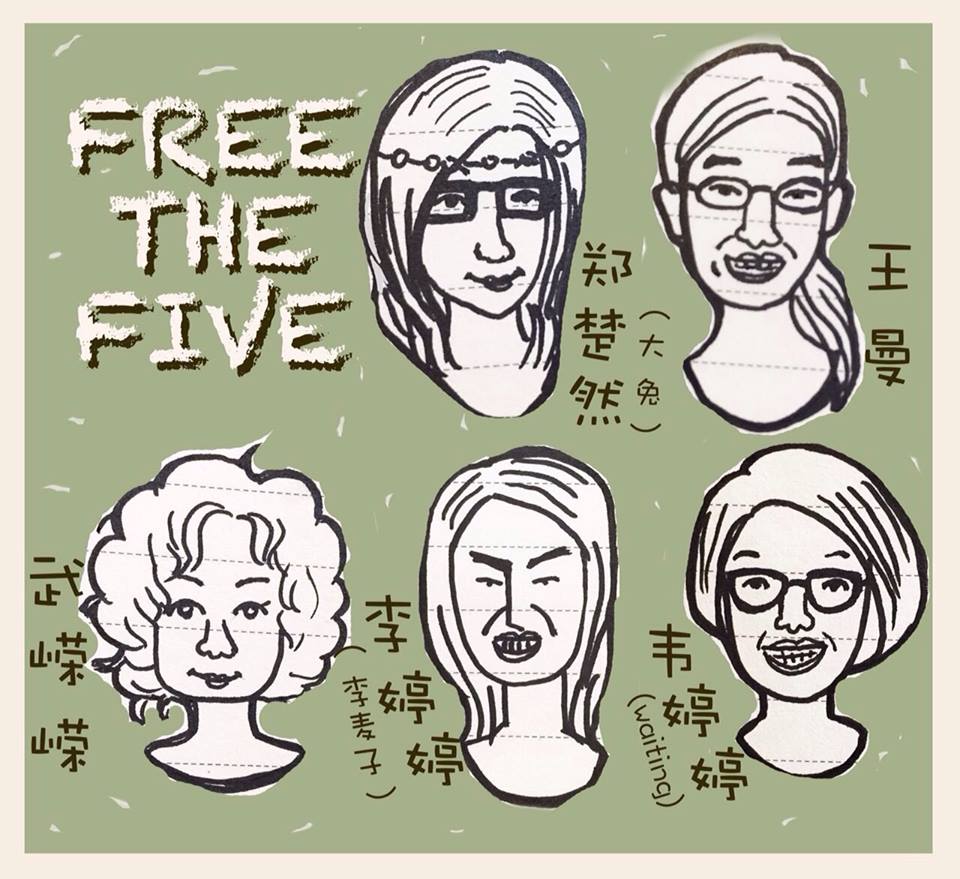Shared posts
Taylor Swift's mother gives moving speech as she honors singer with ACM Milestone Award... a week after revealing cancer diagnosis
Chinese Tourists Arrested For Sexual Harassment in Japan
From NetEase:
3 Chinese “Pervs” Sexually Harass Japanese Girls, Arrested on the Spot
According to news from Japan’s New Huaqiao Online Newspaper, it may be that the media is biased in its presentation, or it may be that individuals are reading too far into it, but in the minds of some Chinese people, Japan is a very sexually liberal country with unique attitudes about sex. Many people know that Japan is a place where sexual harassment often occurs, and that this kind of behaviour is known as “chikan [pervert] behaviour”. If Chinese people know only these things, and they think they know Japan, and think that sexual harassment is insignificant to the point where you can boldly just “give it a shot” while traveling around Japan, than they’re wrong! This kind of misconception will lead to legal consequences, from being fined to prison time.
Information from Japanese police revealed that 3 Chinese tourists were recently detained in succession for violating the “Confusion Prevention Code”. They are suspected of sexual harassment and were considered by police to have been caught red-handed and thus arrested. Among them, one used a mobile phone camera to take an underskirt photo of a woman on an escalator in a mall, one lifted up the skirt of a female passenger while riding a tram, and one man groped a woman’s buttocks while shopping in an adult products store. Although the acts of the three men were different, they all met the same result — being grabbed by their victims and held until police arrived and arrested them at the scene.
According to Japan’s “Confusion Prevention Code” Provision 8, “Perverted Behavior” is punishable by 6 months in prison or a fine of 500,000 Yen. Secretly taking pictures is punishable by one year in prison or a fine of 100,000 Yen and punishments increase for repeat offenders. According to Japanese criminal law regulation 176, in relation to “forced molestation”, the offender can be imprisoned between 6 months and 10 years. After police verify a case, they will first detain the offender. The offender can then choose their own lawyer, or the Japanese government will provide one. In cases where the victim is not willing to settle, the offender will be punished severely in accordance with related laws.
Normally, in situations with Japanese women suffering mental/emotional distress, they often are not willing to make settlements, so the offender will usually be sentenced to the highest possible sentence. For this reason, many Japanese men have lost their reputations and families, making it hard to get their lives back on track. Stories like these are a common occurrence in the Japanese media.
To avoid suspicion, many Japanese men will bring a newspaper on the subway or train during rush hour before and after work. If there are no hand-holds available in the car and they are near women, they place their briefcase in one hand and the newspaper in the other to prove that they don’t have any hands free for “other activities”. The fear that most Japanese men have of becoming entangled in a “perverted behaviour” dispute is quite evident. On the other hand, the Japanese government has carried out all kinds of measures to reduce the possibility of “perverted behaviour” occurring, such as reminding women not to wear excessively revealing clothing and to avoid tightly-packed crowds consisting of mostly men.
Actually, people who have a deep understanding of Japanese society and culture know that the overwhelming majority of modern Japanese women are no longer like the historically weak/delicate “Yamato Nadeshiko”. They have the sense and awareness of self-protection that modern women in modern societies have, no longer like the “silent sheep” of the male-dominated society of the past. When they encounter “perverted behavior”, they no longer suffer in silence, and will often react in the blink of an eye, grabbing the offender on the spot, sometimes “willing to grab the wrong person rather than miss a guilty one”. At the same time, almost all public places are sprinkled with security cameras making it even more difficult for perpetrators to escape. Once they’ve entered the legal process, the rate of Japanese women forgiving offenders is nearly zero.
What is very important to pay attention to is the fact that Japanese judicial institutions will not be lenient to foreigners on the grounds of ethnicity, cultural differences, systems or different customs. In some cases there are trends of dealing stricter punishments to foreigners.
Sound the alarm bells! The “perverted behaviour” of these individual Chinese citizens in Japan goes beyond the realm of good and bad manners, and crosses over into criminal behavior. Not only will this kind of behaviour lead to legal consequences and punishment, once you have a criminal record it will be very difficult to get back into Japan. Because the Japanese system shares information with western countries, your criminal record can interfere with your ability to visit other countries. Furthermore, this kind of behaviour will damage the reputation of overseas Chinese, and the reputation of China. Every person who damages the image of China is despised by the Chinese people.
Note: Image above is illustrative only and is not related to the story.
Comments from NetEase:
柳叶湖畔 [网易湖南省常德市网友]:
If you’ve ever been to Japan, you would know the buildings in Tokyo aren’t even as good as the buildings in a third-tier Chinese city, and yet the truth about Japan’s disorder, filth, and inferiority becomes perfection in the reports of the black-hearted [corrupt] media. Who knows how much dirty money these corrupt media have accepted from the Japanese pirates.
网易福建省厦门市网友 ip:124.15.*.* (In response to the 1st comment)
Frog at the bottom of the well.
范伟骑范玮琪 [网易天津市手机网友]: (In response to the 1st comment)
I bet this guy has never stepped out of the gorge that his home is in.
逐月之风 [网易日本手机网友]: (In response to the 1st comment)
I’m in Japan right now but don’t feel that way.
藤堂君 [网易广西手机网友]: (In response to the 1st comment)
Of course Tokyo isn’t as amazing as your Changde [a prefecture level city in Hunan] and it pales even more in comparison to the metropolis Changsha.😊 [Capital of Hunan]
网易天津市手机网友 ip:60.28.*.* (In response to the 1st comment)
Excuse me, have you ever been there? Get back to moving bricks [the stereotypical manual labor of a low-class Chinese laborer]. You want to make other people hate Japan with you?
网易日本手机网友 ip:119.241.*.* (In response to the 1st comment)
Architecture and cleanliness aren’t the same thing. Have you ever been to Japan? Look around, Japan is the cleanest country on earth.
网易日本手机网友 ip:126.152.*.* (In response to the 1st comment)
I am from Shanghai, and am studying abroad in Tokyo. How come I feel completely different from what you said?
网易浙江省湖州市网友 ip:122.230.*.*
The chikan AV [adult videos featuring public molestation] they watched must exceed a thousand.
大裤衩里话性福 [网易陕西省西安市网友]:
Through a large data analysis, every report about so-called Chinese tourists in Japan behaving so and so all come from Shanghai media, like the Morning Post. They have a tendency toward being Chinese traitors.
106737443 [网易广东省揭阳市普宁市网友]:
They’ve seen too many public molestation videos.
宗泽大元帅 [脑洞大开]:
Deserved it! You’ve got the balls but no skills. Caught on the scene? You’re an embarrassment to Chinese perverts!
格洛丽亚 [网易北京市朝阳区网友]:
All the [Japanese] pornos are lies.
fanglkj [网易浙江省杭州市网友]:
Have these guys just watched too much Tokyo Hot or did they go to get revenge on behalf of all Chinese?
举杯愁 [网易河南省平顶山市手机网友]:
Just how shameless must you be to say this.
上海大炮 [网易福建省厦门市手机网友]:
[They] thought Japanese girls were really open, but actually they are the exact opposite, and even more conservative than Chinese women.
Comments from Phoenix Online:
凤凰网辽宁省沈阳市网友: x亮
Anybody who goes to Japan to travel is inherently crazy. That this kind of thing happens is thus expected.
凤凰网广东省广州市网友: owenlee
They’ve seen too many island movies! [Japanese pornos]
凤凰网广东省广州市网友: 山本长弓
If this is true I hope they get executed and don’t come back.
凤凰网四川省成都市网友: 黑黑黑黑黑黑黑
Goodness, If you want to blame someone, blame the Japanese pornos. This is how a lot of them were filmed!
凤凰网辽宁省大连市网友: 酒风
Ignorant tuhao, got what was coming.
凤凰网江西省南昌市网友: cae30974-fbd7-45fe-a620-
The depraved Japanese country pretends to be demure but is historically the most shameless, morally loose, vulgar, crazy, the most perverse country of depravity!
凤凰网四川省成都市网友: 邪刀
There’s no need to defend these people.
凤凰网广西壮族南宁市网友: 讨厌昵称
Well arrested.
凤凰网广东省梅州市网友: 我的7878
Even losing face is internationalised.
"Chinese Tourists Arrested For Sexual Harassment in Japan"
Originally posted on chinaSMACK - Hot internet stories, pictures, & videos in China
Related Posts



Doctor Who movie mooted in Sony leak
Tanzania's Cyber Crime Bill Gives More Power to Police, Less to People

A young man texting on his mobile phone in Dar Es Salaam, Tanzania. Photo by Pernille Baerendtsen, used with permission.
Pernille Baerendtsen contributed reporting to this post.
On April 1 2015, the Tanzanian parliament passed a cyber crime bill that attempts to address child pornography, cyberbullying, online impersonation, electronic production of racist and xenophobic content, unsolicited messages (i.e. spam), illegal interception of communications, and publication of false information — all in one law.
During the same parliament session three other bills were presented too: Access to Information (ATI), Media Services, and a Statistics Bill. However, the cyber crime bill is new, and the version posted online (not the final version) caused debate instantly.
As in many other countries, online fraud and financial scams indeed are a persistent threat in Tanzania. But the bill covers much more than this. And it has now passed the parliament despite criticism from opposition politicians, social media practitioners and human rights activists. Leading opponents of the legislation from civil society say they will take the government to court if the president signs the bill into law. The Citizen, a local newspaper, has identified several of the most concerning areas of the bill for Internet users.
In an analysis for CIPESA, a regional ICT policy group, Ugandan journalist and analyst Juliet Nanfuka writes that the primary aim of cyber crime bill should be to safeguard citizens’ rights on the Internet. Instead, she says, it shows an “overt disregard for press freedom and freedom of expression, [grants] excessive powers to police, and [limits] protections afforded to ordinary citizens.”
The bill outlaws the publication of “misleading, deceptive or false” information, a measure that Nanfuka noted presents a clear threat to free and open expression online. It gives police wide ranging ability to search the homes of suspected violators of the law, seize their electronic hardware, and demand their data from online service providers. Aidan Eyakuze and Ben Taylor, both of whom work for the independent East African initiative Twaweza, argued that the bill gives too much power to police without meaningful oversight:
…the bill gives even very junior police officers the power to search and/or seize any computer equipment or data, including the content of messages, with no meaningful justification required or oversight provided. This includes demanding information from internet service providers and mobile phone networks.
Tanzanian blogger Thinklessactmore noted that police could use the law to “harass online activists in the name of suspicion of cyber bullying without due [process] of the law.” Twitter user Sultan Rajab, a tax and financial consultant in Tanzania, said he thought well of the bill, but was concerned about the powers it bestows upon police:
@JMakamba it is a good bill/law. I am worried about the power given to our police. Ignorant & low income earners might suffer.
— Sultan Rajab (@SultanKipupwe) April 1, 2015
The bill also criminalizes the sending of information “without prior solicitation” by electronic means. While this section is intended to address spam and phishing attacks, it could be interpreted quite broadly. Maria Sarungi Tsehai, a communications expert and founder of the organisation Change Tanzania, asked:
“@jpb4rretto: @MariaSTsehai How is any message transmitted with solicitation? Call me and ask me to write you and email? #CyberCrimeBill“
— Maria Sarungi Tsehai (@MariaSTsehai) April 2, 2015
The Cyber Crime Bill relates to the aforementioned new bills on Access to Information, Media Services, and Statistics — all of which could have a serious impact on free expression in Tanzania. But unlike the Cyber Crime Bill, none of these three bills have been shared with the public in their current versions.
Commenters on social media and journalists are sharing opinions on why they think the Tanzanian government has an interest in keeping these bills from the public, while at the same time rushing the process. Some question if it is due to the fact that Tanzania is preparing for elections in late October 2015. Tanzania's ruling party, Chama Cha Mapinduzi (CCM), over the past few years increasingly has confronted the growing influence of opposition parties. At the same time, journalists and media have also faced threats and violence.
Writing on Washington Post blog, Keith Weghorst and Ruth Carlitz argue that fast-tracking the bills is “consistent with the behavior of a ruling party willing to hold onto power at all costs.” They write, “The more that the government can weaken the legitimacy of opposition criticism—by monopolizing the flow of public information—the better they are positioned to prevent scandals and poor performance from hurting them at the polls.”
Thinklessandactmore was impressed that Tanzania has realized the need to regulate the Internet use, but said the bill was rushed into parliament:
It’s important to have [a] law that would regulate online activities and the use of internet but it should be done in a right way. There is no hurry in having such law; there was none in the past 53 years of independence. If it takes one or two years to have a better cyber-crime law be it so, let’s conduct enough research on the issues; collect different opinions about the bill before it is present in the parliament.
Lwanda Magere, a software engineer, accused its authors of using a “copy-paste” strategy:
Cyber Crime Bill Tanzania: copied and pasted, almost zero ability to implement.
— Lwanda Magere (@nndekindo) April 7, 2015
Tanzanian blogger PATO jokingly shared a photo showing the number of members of parliament who passed the bill:
These are your MPs that passed the #CyberCrimeBill y'day! Vote wisely in October fellas! pic.twitter.com/pEScSHYYPZ
— PATO♠️ (@PatNanyaro) April 2, 2015
Written by Ndesanjo Macha
· comments (0)
Donate
· Share this: twitter facebook reddit googleplus
US Ambassador Kennedy Visits Hiroshima Acknowledging Legacy of Atomic Destruction

Reproduction of The Hiroshima Panels (原爆の図) by Maruki Iri and Maruki Toshi, displayed at Higashi Honganji Temple Gallery, Kyoto. Photo courtesy Nevin Thompson.
US Ambassador to Japan Caroline Kennedy visited Hiroshima in April, generating goodwill from her Japanese hosts.
今日広島を訪れて、核兵器のない世界のために努力を続けることが大事なのだという思いを新たにしました
— キャロライン・ケネディ駐日米国大使 (@CarolineKennedy) April 17, 2015
Visiting Hiroshima is a profound reminder that we should continue working toward a world without nuclear weapons
— キャロライン・ケネディ駐日米国大使 (@CarolineKennedy) April 17, 2015
As US ambassador to Japan, Kennedy attended the 69th anniversary of the atomic bombing in August 2014 – only the second time a sitting US ambassador had attended the annual memorial service for victims of the 1945 Hiroshima bombing.
John Roos, Kennedy's predecessor as US Ambassador to Japan, was the first US representative ever to attend the official annual August memorial service in Hiroshima. Roos attended the service in August, 2010, marking the 65th anniversary of the atomic bombings and the end of World War II.
As Caroline Kennedy's predecessor, John Roos also established deeper ties between the US and Japan following the 2011 Tohoku disaster, where he helped lead a massive American aid and recovery effort in Japan's stricken northeast.
What also makes Ambassador Kennedy's April visit to Hiroshima notable is that she also visited Hiroshima's Peace Memorial Museum and laid a wreath at the cenotaph for A-bomb victims — unprecedented for a sitting US ambassador.
Ambassador Kennedy, the only surviving offspring of President John F. Kennedy, had first visited the Hiroshima museum in 1978 when she was accompanied her uncle, then-US Senator Edward Kennedy.
The American ambassador's decision to visit the Hiroshima memorial and Peace Museum is significant to many Japanese people, and follows President Obama's 2009 and 2013 calls for nuclear disarmament. Residents of Hiroshima and Nagasaki, the only two cities in the world to experience a nuclear attack so far, have long called for the abolition of nuclear weapons.
Kennedy's visit to Hiroshima comes exactly one month after Hiroshima Mayor Kazumi Matsui expressed disappointment over Russian President Vladimir Putin’s remarks in a documentary broadcast that Moscow was ready to put its nuclear weapons on alert amid the crisis in Ukraine, just as Japan was finalizing a trade agreement with Russia; Japan later imposed sanctions on Russia over the Crimean invasion.
【#広島】「被爆地ヒロシマの願いに背くものだ」広島市長、プーチン氏のウクライナ危機・核兵器準備発言を批判 毎日新聞 3月16日(月)21時50分配信 ロシアのプーチン大統領が、ウクライナ南部クリミアを1年前に… http://t.co/YM7KdNV8EW
— DatNews (@DatNews) March 16, 2015
“Russia is ignoring the pleas of Hiroshima, (a city that has experienced first-hand the horror atomic bombing).” – Hiroshima mayor criticizes Russian President Vladmir Putin over Ukraine nuclear weapons remarks. [Putin says he was prepared to put nuclear weapons on standby during Crimea crisis one year ago.]
Russia's ambassador to Japan, Evgeny Afanasiev responded:
【New】「ロシアの核を責める前に、原爆投下したアメリカに抗議を」 広島市長に駐日大使が反論 http://t.co/WQRoQ5RloT pic.twitter.com/Yo9ipn31ho — ハフィントンポスト日本版 (@HuffPostJapan) April 13, 2015
“Before criticizing Russia over nuclear weapons, talk to America, the country who dropped the bomb on you (first).” Russian ambassador's response to Hiroshima mayor.
However, many Hiroshima residents were just glad that Kennedy threw the opening pitch for hometown baseball favorites the Hiroshima Carp.
Go Carp! pic.twitter.com/AGHE8gw3uq
— キャロライン・ケネディ駐日米国大使 (@CarolineKennedy) April 17, 2015
Written by Nevin Thompson
· comments (0)
Donate
· Share this: twitter facebook reddit googleplus
What Are We Doing to Our Children's Brains?

Tehmina Shekh photographed at the Chingari Clinic in Bhopal, India — the location of one of the world's worst chemical disasters. Photo by Flickr user Bhopal Medical Appeal. CC-BY-NC-SA 2.0
This post by Elizabeth Grossman was originally published on Ensia.com, a magazine that highlights international environmental solutions in action, and is republished here as part of a content-sharing agreement.
February 16, 2015 — The numbers are startling. According to the U.S. Centers for Disease Control and Prevention, about 1.8 million more children in the U.S. were diagnosed with developmental disabilities between 2006 and 2008 than a decade earlier. During this time, the prevalence of autism climbed nearly 300 percent, while that of attention deficit hyperactivity disorder increased 33 percent. CDC figures also show that 10 to 15 percent of all babies born in the U.S. have some type of neurobehavorial development disorder. Still more are affected by neurological disorders that don’t rise to the level of clinical diagnosis.
And it’s not just the U.S. Such impairments affect millions of children worldwide. The numbers are so large that Philippe Grandjean of the University of Southern Denmark and Harvard T.H. Chan School of Public Health and Philip Landrigan of the Icahn School of Medicine at Mount Sinai in New York — both physicians and preeminent researchers in this field — describe the situation as a “pandemic.”
While earlier and more assiduous diagnosis accounts for some of the documented increase, it doesn’t explain all of it, says Irva Hertz-Piccioto, professor of environmental and occupational health and chief of the University of California, Davis, MIND Institute. Grandjean and Landrigan credit genetic factors for 30 to 40 percent of the cases. But a significant and growing body of research suggests that exposure to environmental pollutants is implicated in the disturbing rise in children’s neurological disorders.
What, exactly is going on? And what can we do about it?
Chemicals and the Brain
Some chemicals — lead, mercury and organophosphate pesticides, for example — have long been recognized as toxic substances that can have lasting effects on children’s neurological health, says Bruce Lanphear, health sciences professor at Simon Fraser University. While leaded paint is now banned in the U.S., it is still present in many homes and remains in use elsewhere around the world. Children can also be exposed to lead from paints, colorings and metals used in toys, even though these uses are prohibited by U.S. law (remember Thomas the Tank Engine), and through contaminated soil or other environmental exposure as well as from plastics in which lead is used as a softener. Mercury exposure sources include some fish, air pollution and old mercury-containing thermometers and thermostats. While a great many efforts have gone into reducing and eliminating these exposures, concerns continue, particularly because we now recognize that adverse effects can occur at exceptionally low levels.

At early stages of development — prenatally and during infancy — brain cells are easily damaged by industrial chemicals and other neurotoxicants. Photo by Flickr user Jason Corey. CC-BY-NC-SA 2.0
But scientists are also now discovering that chemical compounds common in outdoor air — including components of vehicle exhaust and fine particulate matter — as well as in indoor air and consumer products can also adversely affect brain development, including prenatally.
Chemicals in flame retardants, plastics, and personal care and other household products are among those Lanphear lists as targets of concern for their neurodevelopment effects.
Chemicals that prompt hormonal changes are increasingly suspected to have neurological effects, says Linda Birnbaum, director of the National Institute of Environmental Health Sciences and National Toxicology Program. Among the chemicals now being examined for neurological impacts that occur early in life are flame retardants known as PBDEs that have been used extensively in upholstery foams, electronics and other products; phthalates, widely used as plasticizers and in synthetic fragrances; the polycarbonate plastic ingredient bisphenol A, known commonly as BPA; perfluorinated compounds, whose applications include stain-, water- and grease-resistant coatings; and various pesticides.
Precise Choreography
As Grandjean and Landrigan explain, the fetus is not well protected against environmental chemicals that can easily pass through the placenta. There’s evidence from in vitro studies, they say, that neural stem cells are very sensitive to neurotoxic substances.
In the past 30 to 40 years, scientists have begun to recognize that children and infants are far more vulnerable to chemical exposures than are adults.
An infant’s brain is also vulnerable to such contaminants. At early stages of development — prenatally and during infancy — brain cells are easily damaged by industrial chemicals and other neurotoxicants. Such interference can affect how the brain develops structurally and functionally — effects that lead to lasting adverse outcomes.
“The brain is so extremely sensitive to external stimulation,” says Grandjean.
Historically, chemical neurotoxicity was examined in adults — often through cases of high levels of occupational exposure. In the past 30 to 40 years, however, scientists have begun to recognize that children and infants are far more vulnerable to chemical exposures than are adults. It has also been discovered that very low levels of exposure early in life can have profound and lasting effects. Another important discovery is that understanding how an infant or child is affected by a chemical exposure involves far more than simply calculating potential effects on a physically smaller person. Stage of development — and timing of exposure — must also be considered. Early stages of brain development involve “a very precise choreography,” explains Frederica Perera, professor of Environmental Health Sciences at Columbia University’s Mailman School of Public Health. “Any chemical that can disrupt [brain] chemistry at this stage can be very damaging,” she says.
For example, explains Deborah Kurrasch, an assistant professor at the University of Calgary’s Cumming School of Medicine who specializes in neurological research, during the early stages of brain development — when cells are becoming neurons — “timing determines destination.”
Results of Kurrasch’s latest study investigating neurodevelopmental effects of BPA illustrate what she means. In a study published in January 2015, Kurrasch and colleagues examined the effects on neurodevelopment of BPA and a common BPA substitute, bisphenol S. Specifically, they investigated how exposure to BPA and BPS — at levels comparable to those present in her community’s local drinking water supply — might affect neuron development in zebrafish at a stage comparable to the second trimester of human pregnancy, when neurons are forming and moving to the correct location in the brain.
Many of the chemicals under scrutiny for their effects on brain development appear to act by interfering with the function of hormones essential for healthy brain development.
“It’s as if they’re getting on a bus to where they need to be,” Kurrasch says. After exposure to BPA and BPS it was as if, explains Kurrasch, “twice as many neurons got on an early bus and half as many got on a late bus.” The researchers found that these exposures appeared to alter nerve development — neurogenesis — in a way that caused the fish to become hyperactive. Such an alteration, produced in this case by a “very little bit of BPA,” can cause permanent effects, Kurrasch says.
Many of the chemicals under scrutiny for their effects on brain development — BPA, phthalates, perfluorinated compounds, brominated flame retardants and various pesticides among them — appear to act by interfering with the function of hormones essential for healthy brain development. Among these are thyroid hormones, which regulate the part of the brain involved in a variety of vital functions, including reproduction, sleep, thirst, eating and puberty.
During the first trimester of pregnancy, the fetus is not making its own thyroid hormone, says Thomas Zoeller, director of the Laboratory of Molecular, Cellular and Developmental Endocrinology at the University of Massachusetts Amherst. If an environmental exposure to a substance such as a polychlorinated biphenyl or perchlorate interferes with the mother’s thyroid hormones in this period — as could happen through water pollution, for example — that could in turn affect her child at a critical stage of brain development.
Another thing to consider in the context of endocrine-disrupting chemical exposures, says Zoeller, is that a substantial portion of women of childbearing age in the U.S. have some iodine deficiency that may be suppressing their thyroid hormones. While these deficiencies may not be prompting clinically adverse effects, they may be sufficient to impair fetal neurodevelopment. “Impacts can happen at levels far below safety standards,” says Zoeller. And there are a great many chemicals to which such women may be exposed environmentally with the potential to affect thyroid hormones, among them PBDEs, PCBs, BPA, various pesticides, perfluorinated compounds and certain phthalates.
Something in the Air
One particularly concerning source of exposure to chemicals that are suspected to harm children’s brain development is air pollution, which is a complex mixture of various chemicals and particulate matter.
Research increasingly suggests that airborne contaminants can have subtle but significant effects on early neurological development and behavior.
Perera and colleagues recently investigated the links between exposure to polycyclic aromatic hydrocarbons, a fossil fuel–related component of air pollution, and incidence of ADHD in 9-year-olds. Their study found that mothers who were exposed to high levels of PAH during pregnancy were five times more likely to have children with ADHD and to have children with more severe ADHD symptoms than those who did not have such exposure. While this study is the first to make such a connection, it joins a growing body of research pointing to links between outdoor air pollutants, including PAHs, and adverse impacts on children’s brain health and development.
Looking at air pollution’s effects on brain health is relatively new, explains Kimberly Gray, health science administrator at the National Institutes of Health. Research increasingly suggests that airborne contaminants can have subtle but significant effects on early neurological development and behavior, she says. In addition to links between prenatal PAH exposure and impaired brain function, researchers are also now investigating potential connections between black carbon, volatile organic compounds and fine particulate matter — among other components of air pollution — and impairments such as autism and lowered IQ.
In a study published in December 2014, Marc Weisskopf, Harvard T.H. Chan School of Public Health associate professor of environmental and occupational epidemiology, and colleagues looked at children whose mothers were exposed to high levels of fine particulate matter (PM2.5, particles 2.5 microns in diameter or smaller), particularly during the third trimester of pregnancy. The study, which involved more than 1,000 participants living all across the U.S., found that these children appeared to be twice as likely to be diagnosed with autism as children whose mothers had only low levels of such exposures. Exposure to larger particles — between 2.5 and 10 microns (what’s known as PM10) — did not appear to be associated with increasing risk for autism.
“This is very important from an epidemiological point of view” because it “places a spotlight on the mother’s exposure,” says Weisskopf. It also highlights the importance of timing and neurodevelopmental effects. Although many other factors may contribute to autism, Weisskopf explains, this study strengthens the suggestion that environmental exposures can play a role. That it appears it is the very small particles that are associated with these effects adds to what other research is finding: What might seem quantitatively small can “be quite important” when it comes to affecting brain development, Weisskopf explains.
Columbia University researchers recently published an additional study linking common air pollutants to cognitive and behavioral impairment in children.
Widespread Exposure
As Grandjean and Landrigan point out, one of the disturbing recent realizations concerning environmental exposure to developmental neurotoxicants is how widespread exposure appears to be and the ubiquity of such compounds. “More neurotoxic chemicals are getting into products,” says Landrigan.
Phthalates, which are used as plasticizers — including in polyvinyl chloride plastics — and in synthetic fragrances and numerous personal care products, comprise one category of widely used chemicals that appear to have adverse impacts on brain development. Researchers at Columbia University’s Mailman School of Public Health recently found that children exposed prenatally to elevated levels of certain phthalates had IQ scores that were, on average, between 6 and 8 points lower than children with lower prenatal exposures. Children with reduced IQ scores also appeared to have trouble with working memory, perceptional reasoning and information processing speeds.
“Pretty much everybody in the U.S. is exposed.” — Robin Whyatt
The phthalates examined in this study, known as DnBP and DiBP, are used in numerous household products, including toiletries and cosmetics, among them shampoo, nail polish, lipstick, hair styling products and soap, as well as vinyl fabrics and dryer sheets. Exposure levels associated with reduced IQ in the study are within the range that the CDC reports finding in its National Health and Nutrition Examination Survey, a nationwide ongoing biomonitoring assessment of chemical exposures. “Pretty much everybody in the U.S. is exposed,” says study co-author Robin Whyatt, professor of environmental health sciences at Columbia University Medical Center.
While such a drop in IQ may sound small, Pam Factor-Litvak, the study’s lead author and associate professor of epidemiology at the Mailman School, notes that at the population — or classroom — level, this means fewer children at the high end of the intelligence scale and more at the less capable end. “The whole curve shifts downward,” she explains.
“Five or six IQ points may not sound like much, but it means more children requiring special education programs and fewer that are gifted,” says Maureen Swanson, Learning Disabilities Association of America’s Healthy Children Project director. “The potential economic impact is huge,” says NIEHS’s Birnbaum.
The Stress Factor
What prompts neurological disorders in children is “very complex,” notes Frederica Perera. Adding to the challenge of disentangling the various contributing factors is that while research on — and regulation of — chemicals typically looks at one substance at a time, people are exposed to multiple chemicals concurrently. Further adding to this complexity when it comes to brain development are social stresses that “act on the same part of the brain region,” explains University of Rochester professor of environmental medicine Deborah Cory-Slechta. She and others are finding increasing evidence that nonchemical stressors such as maternal, domestic and community distress can prompt adverse effects on early brain development, either on their own or in combination with neurotoxic chemicals.
Birnbaum says this apparent interaction between chemicals and nonchemical stressors is “very concerning and very important.”
Epidemiological studies, Cory-Slechta explains, typically correct for what are called confounding factors — other conditions that might influence the condition being measured. Many studies, she says, “are clearly not modeling what is going on in the human environment.” What she and her colleagues hope to do is “reproduce in animal studies what goes on in human communities,” particularly in communities that are most vulnerable to adverse social stressors and most exposed to chemical contaminants, including lead, pesticides and air pollution.
Lead and stress affect the same part of the brain, she says, and so can act synergistically very early in life to produce permanent changes in brain structure. These changes can result in lowered IQ, learning and behavioral problems.
Cory-Slechta’s lab is now working on replicating conditions of stress and chronic deprivation in animal models that would mirror those experienced by communities of poverty. The aim is to better understand how these effects cross the placenta and become the fetal basis of lifelong disorders. She and her colleagues are investigating, not only associations between exposures and neurodevelopment, but also the mechanisms by which effects occur.
What to Do?
Assuming we want to stop harming our children’s brains, how do we proceed?
An important step is to improve our ability to determine which chemicals have neurodevelopmental effects. A rapid screening system would be ideal, says Birnbaum, because there are so many chemicals — including newly invented ones — to which people are exposed. While such a program to test large numbers of chemicals quickly using robotics has been launched by NIH, EPA and other federal agencies, there are tens of thousands that may be in use, most of which have not been fully tested for these effects.
When it comes to reducing existing exposures, some chemicals can be avoided through consumer choice. But it’s often difficult, given that many of these substances are used — like BPA on receipts — in products that don’t carry ingredient labels. Others, including air pollutants, are much harder given their ubiquity or lack of available alternatives. And, as Maureen Swanson notes, such choices are not necessarily feasible for people at all economic levels, which raises environmental justice issues.
Grandjean and Landrigan point out that the U.S. system of chemical regulation, which lacks requirements for full premarket toxicity testing, does not do a very good job when it comes to proactive chemical safety. “Untested chemicals should not be presumed to be safe to brain development, and chemicals in existing use and all new chemicals must therefore be tested for developmental neurotoxicity,” they wrote in an article published in The Lancet.
While some sources of neurotoxicity might appear to have been adequately addressed, they have not. For example, considerable progress has been made in curtailing lead exposure through policy and public health education in the U.S. and elsewhere. However, current understanding is that virtually any amount of lead exposure can cause damage, and harmful exposures continue — especially in countries where leaded paints and gasoline are still used . And in the U.S., CDC funding for lead prevention programs was dramatically reduced in 2012.
When it comes to protecting the exquisitely sensitive developing brain, the measures currently used to assess chemical risk and set safety standards fall short, says Cory-Slechta.
Meanwhile, children around the world — especially in less well-off countries — continue to be exposed to dangerous neurotoxicants released in industrial emissions, from waste sites and through child labor. Examples abound, and include exposures to chemicals released in electronics recycling in various locations in Asia and Africa, to lead and mercury from mining activity, to agricultural pesticides, to products contaminated with heavy metals, including food and candy.
When it comes to protecting the exquisitely sensitive developing brain, the measures currently used to assess chemical risk and set safety standards fall short, says Cory-Slechta. “It should be about primary prevention, but it’s not,” she says.
In the absence of what many environmental health advocates feel is adequate U.S. federal regulation of chemicals, many individual U.S. states have recently passed their own laws to protect children from harmful chemical exposures. Many address chemicals with neurotoxic effects, particularly those of heavy metals such as cadmium, lead and mercury. And even though some states are beginning to include language in their legislation to protect pregnant women from chemical hazards, this timing of exposure is left largely unaddressed.
While we now know a great deal about developmental neurotoxicants, more such exposures appear to be occurring than ever before. And there appears to be wide agreement among researchers that these exposures are taking a toll on the world’s children.
“To me it is very clear we have to set up a different system to better protect the brains of the future,” says Grandjean.
Written by Ensia
· comments (2)
Donate
· Share this: twitter facebook reddit googleplus
YouTube sensation and entrepreneur Michelle Phan bringing 2 of her businesses to Asia

Michelle Phan, one of YouTube’s leading ladies with over 1.1 billion total views and more than 7.6 million subscribers, is moving to Japan. The Vietnamese-American web celebrity and entrepreneur, propelled to fame by her successful beauty tutorials, told Tech in Asia that she will be temporarily relocating to Tokyo in order to bring two of her businesses to Asia.
“It’s my third time [in Tokyo] this year,” Phan said during a recent media roundtable at YouTube Studios in Tokyo. “I’m learning a lot about digital markets, learning about infrastructure for creators to make their own content and brands […] I’ll be moving out here for six months to build a studio.”
Phan launched lifestyle network Icon on March 31 through a partnership with Endemol Shine Group, the world’s largest independent production company. Her ultimate goal is to bring a global network of talented individuals from the computer screen to the living room television and beyond.
Focus on creators
“Being a multi-platform network means that we’re not just going to be in one place,” she said. “We’ll be on YouTube, we’ll be on TV – any [outlet] that can play content, we’ll be there.”
Phan explains that she’s not interested in the multi-channel model (MCN), which entails aggregating hundreds of channels because it doesn’t provide direct support for content creators. This was the approach used by FAWN (For All Women Network), a MCN that Phan launched on YouTube in 2012.
“We’d rather pick around 20 creators who are very talented and gifted and put our muscle and resources into building their brands,” she said. “Quality over quantity […] We’re here on the ground looking passionately for people who can help us build a studio and the infrastructure necessary to have [Icon] available here in Japan – not only for creators, but as a new hub for everyone because we’ll need engineers and a massive team.”
Phan plans to launch Icon in Japan and “select countries in Southeast Asia” by the end of the year. Rather than blindly diving into new markets, she’s opting to test international waters firsthand.
“I’m not interested in just spreading my businesses like a weed, but really want to live the life and understand the culture of a region before cementing any plans to expand operations,” Phan added. “I plan for Icon to have a presence in many countries because there are talented people everywhere. Because Endemol Shine Group already has a global presence and infrastructure, entry will be relatively quick and seamless.”
Going glam
Icon isn’t the only product that Phan is bringing across the Pacific. Ipsy, her tailored fashion bag subscription service, is also headed for Asia. Ipsy’s “glam bags,” which cost US$10 a month, contain four to five beauty product samples each and are customized based on a subscriber’s personal tastes and style.

Ipsy, which currently ships to the US and Canada only, raised US$2.75 million from Silicon Valley investors back in 2012. Phan says that the startup is on track to generate over US$120 million in revenue this year.
“[Glam bags] are bright, shiny pink bags and women get so excited when they see them in their mailboxes,” she explained. “Over a million bags are shipping this month alone […] We grew very fast by creating content on YouTube and other digital platforms, and also by building a community and making a great customer experience. By bringing Ipsy to Japan, we will help beauty creators make their own careers like myself.”
Growth is largely user-driven, as “glam bag opening” videos have their own YouTube following, complementary to the Michelle Phan empire.
Despite her visible excitement for its upcoming entrance into the Japanese market, Phan wouldn’t speculate on a specific launch date for the service.
“Because Ipsy has a commerce component to the business, I’m taking the approach of comprehensively learning and understanding everything from Japan’s high-level economics down to the consumer behavior level to inform the best approach to open up shop,” Phan said. “We are treating each regional expansion [beyond Japan] as a unique effort. It’s important that we gain the appropriate understanding of what it would take to expand operations into other countries on an individual level. There are cultural implications in technology, business and life in general that will be key to defining the business models for different countries.”

Subcom subpar
Ipsy’s success in North America may prove difficult to replicate in Asia, a region saturated with competitors. The beauty box subscription model itself appears to be a passing trend in some markets and a logistical nightmare in others. Many of those that remain have had to pivot or adopt a general ecommerce approach to stay afloat.
Rocket Internet’s Glossybox service was forced to downsize after over-expansion in Asia. Last year it retreated to the US and Europe.
VanityTrove, once Singapore’s biggest subscription cosmetics box supplier, is now a ranking and curation platform with no visible ecommerce aspect to speak of. Memebox, the first Korean startup accepted into Y Combinator (disclosure: Tech in Asia is a Y Combinator startup. Read our ethics statement), expanded its beauty box service to include straight-up ecommerce. With US$29 million in funding, it could be Ipsy’s most formidable challenger in Asia.
Other potential Asian rivals to Ipsy include (but are certainly not limited to) Bellabox, Glamaclub, and Modbox.
Stardom
Phan began creating makeup tutorials and posting them to YouTube in 2007. She never expected that they would propel her to fame and fortune, but rather recognized an unfulfilled need for women like her.
“Back then, if a woman wanted to learn how to apply makeup, she’d have to sit at a beauty counter or buy a book,” Phan explained. “I saw that this was a market that could be revitalized with YouTube.”

For the first two years, Phan gained followers but didn’t generate any income from YouTube. That changed after Buzzfeed posted two of her videos in 2009 and 2010.
“First it was 25 cents a day, then 5 dollars a day,” she said. “When I hit US$25 a day, I quit my job as a waitress, which freed me up to create content full time. I just focused on creating powerful content and building influence. We’re living in an age where influence is the new currency, its the new power, and it can make or break your business.”
Phan, who was once denied a job at a Lancome makeup counter, became the cosmetic giant’s official video makeup artist in 2010. She launched Ipsy in 2011 after watching women in Thailand line up to buy cosmetics samples – something she had never witnessed in the US. After asking around, she found out that it was because women cannot return opened cosmetics there if they’re not satisfied. Phan also launched her own makeup line, Em Cosmetics, in 2013.
Following a legal dispute with Ultra Records over background music used in several of her videos, Phan founded independent record label Shift Music Group last September. The venture, in partnership with Cutting Edge Group, seeks to both finance and create music to be used in film, TV shows, and advertisements.

“Because of what I learned from that experience, I’m building infrastructure to protect creators,” Phan said. “If you stumble and fall, you brush yourself and move forward, but you should also inform and help others so that they don’t have to fall too.”
As for why Phan chose Japan as the base of operations for her next adventure, she added:
I’m totally in love with and completely fascinated with Japanese fashion, culture, and trends. My drive to expand abroad stems from simply going where my interests and passions are. What excites me about the retail fashion industry in Japan is the exclusivity and uniqueness of clothing and accessories that are resultant from a rapidly rotating trend landscape. I plan to bring elements I love from Japan to the US, and vice versa. Some of my businesses will do great in Japan right away, and some will require more time to immerse myself in the market and formulate a plan of approach that will work with Japan’s economic and transactional infrastructure. The same can be said for entering the market in China or any other country. Each country will be a new challenge and adventure, and will all require careful and wise investments in timing, planning and resources to maximize on opportunities.
This post YouTube sensation and entrepreneur Michelle Phan bringing 2 of her businesses to Asia appeared first on Tech in Asia.
What Does Censoring Nude Art Say About Us and Our Social Networks?
The nude, one of the oldest and most recurrent subjects in the art world, has led to the suspension of many Facebook accounts over the years. One recent and widely reported example was the account of Jerry Saltz, an art critic from New York Magazine. Last month, his account was suspended because he shared images deemed inappropriate, according to the network's terms of service.
On digital media, inappropriate often means naked. In Saltz's case, the images were provocative and deemed to be pornographic, according to the New York Times’ ArtsBeat blog. But the same criteria has been applied to a broad range of images, from breastfeeding mothers to artists whose works reveal nipples, penises, and in particular, vaginas. The female reproductive organ seems all but banned from social networks, even in the case of a reproduction of Gustave Courbet's famous 1866 painting The Origin of the World.
Venezuelan performance artist Erika Ordosgoitti, whose art focuses primarily on the female body, is another example of a person who has faced numerous challenges due to her publishing nude works on social media. Among other works, Facebook has censored a portrait of her naked body five times in a row.

Screenshot of a report on pornographic content in Facebook saying that Erika's photo has been reported and therefore, deleted. Shared by Erika Ordosgoitti.
The above text, explaining Facebook's reasons for deleting the photo reads: “We have reviewed the photo reported on the basis of nudity or pornography. As it infringes our Terms of Service, it was removed. Thanks for reporting. We already told Erika Ordos that we deleted her photo, but we did not tell her who filed the complaint. Facebook never discloses the identity of the person filling the report.”
Global Voices asked Ordosgoitti to tell us about her experience with censorship on social media platforms. From there, we started to think about how both users and system administrators facilitate censorship. This post will be the first in a series of publications that will address the different ways of dealing with art censorship, based on the stories of Erika Ordosgoitti and other artists who have been restrained by social networks’ terms of service and by social conventions.
Ordosgoitti's latest exhibition, titled Comida de moscas (Food for Flies), comments on the censorship that she has experienced and managed to document.
Warning: The photograph shown below contains graphic language.
Los primeros años fue un fenómeno de redes. Continuamente me cerraban la cuenta, me bloqueaban, me advertían; yo deliberadamente insistía. Recibí muchos insultos y algunas pocas amenazas de muerte.
In the first years, the page went viral online. They continually closed my account, blocking me, and warning me, and I kept on deliberately posting my work. I received many insults and a few death threats.

Video installation with insulting comments received by Ordosgoitti from users in Internet. Shared image by the artist and published with permission.
Venezuelan artist Eliseo Solis Mora found himself in a similar situation not long ago. He was blocked by Facebook for publishing a self-portrait—a frontal nude that is part of a performance art piece. He writes:
Las redes hoy son un medio complejo. Me han censurado en varias de ellas por los contenidos de mis fotos. En Facebook publiqué una imagen de Esther Ferrer y me bloquearon. Me volvió a ocurrir con un desnudo que luego dediqué a Ai Weiwei. En Instagram borraron automáticamente una imagen mía que fue denunciada…
Networks are nowdays a complex medium. I have been banned for my photos. On Facebook, I posted a picture of Esther Ferrer and they blocked me. It happened again with a nude that I later dedicated to Ai Weiwei. On Instagram, they automatically erased an image that was reported.
Complainants remain anonymous
Ordosgoitti says artists are usually blocked or censored because of complaints filed by other users with access to their accounts.
He tenido ya unas siete cuentas diferentes en Facebook. En la actualidad conservo dos, una oficial y otra alternativa, por lo general una de ellas está bloqueada, entonces uso la otra para superar el bloqueo
I've had about seven different Facebook accounts. Currently I have two Facebook accounts: an official account and an alternative one, and usually one of them is blocked, so I use the other to bypass this.
The artist says the criteria for censorship are applied loosely and unequally. She also notes that users who file unreasonable complaints face no penalties:
Responsabilizo de esta censura en primer lugar a Facebook porque sus políticas promueven conductas de sapeo [delación] anónimo. Considero que esta política es injusta, porque no me da derecho de saber quién me está denunciando ni sus razones […] Al denunciante se le agradece, sin saber si su denuncia es válida. Aunque las condiciones de publicación son claras, las razones de censura no lo son, porque en la actualidad (no siempre fue así) se supone que sus intenciones son excluir la pornografía o imágenes sexuales explícitas, por lo tanto quedarían exentas las imágenes científicas o artísticas pero ¿cómo diferenciar imágenes pornográficas o vulgares de imágenes artísticas?
Facebook is the first to be blamed on this form of censorship because their policy promotes anonymous reporting. I believe this policy is unfair, because it doesn't give me the opportunity to know who is denouncing me and why […]. They thank the user who's complaining, without even knowing if the report is valid. Although the terms of use are clear enough, the reasons for censorship are not, because nowadays (and it was not always like this) it is assumed that their intention is to exclude pornography or sexually explicit images, a policy that can thereby extend to exempting scientific and artistic images. But how do you differentiate pornographic or vulgar images from artistic ones?
Facebook's decision to protect the identity of those who denounce images reflects an intention to keep these situations from instigating conflict between users. But it also presents new challenges, as the artists indicate.
Solís Mora, whose body images online have also encountered censorship, considers the criteria for censoring artistic images on digital media undemocratic:
…las celebridades tienen mayores libertades. Prueba de ello es el famoso wallpaper de Kim Kardashian exhibiendo el trasero, que se volvió viral a través de las redes sociales. Hay algo interesante que uno nota nada más al abrir el Instagram: a diario se publican este tipo de imágenes, que tienen miles de likes y son sexismo puro, pero hay obras de arte que son automáticamente bloqueadas…
…celebrities have more freedom. Proof of this is the famous wallpaper with Kim Kardashian showing her butt that went viral through social networks. There is something interesting that you notice when you open Instagram: there are sexist images published everyday with thousands of ‘likes’ while there are works of art that are automatically blocked …
Solís Mora recently published a warning—or rather a manifesto—on his Facebook wall:
Sí en esta cuenta, que en gran medida está manejada como herramienta de trabajo, me desnudo y tú que lees (sé no son tod@s) la denuncias o sencillamente no te gusta, pasa la página…Recomiendo entonces que si eres mi amigo o amiga virtual, entiendas que soy un artista y mi libertad creadora es total, aquí solo muestro arte.
If on this account, which is largely handled as a working tool, I show my naked body and if you, dear reader, don't like it, just turn the page … I recommend then, that if you're my friend or virtual friend, try to understand that I am an artist with total creative freedom and that what I show here is art.
Like Ordosgoitti, Mora has been bullied and even received death threats because of his work. For him, censorship from cultural institutions has always been something he's had to deal with, but the constraints on his online artistic freedom, he says, are growing:
El problema va más allá de la mera denuncia, es la imposibilidad de ser libre. Sin embargo, me gusta que hoy se hable del desnudo, aún cuando es el tema más antiguo del arte…
The problem goes beyond reporting—the real problem is the lack of freedom. However, I like to hear people talking about nude, even though it is the oldest subject in the art world…
Written by Carmen Victoria Mendez · Translated by Liliane Tambasco
· View original post [es] · comments (0)
Donate
· Share this: twitter facebook reddit googleplus
Japan's ‘Vagina Artist’ Denies Obscenity Charges
Japanese artist Megumi Igarashi, nicknamed “The Vagina Artist” by the Western media, says there's nothing obscene about artwork based on her genitalia.
ろくでなし子こと五十嵐恵さん初公判 「私は猥褻ではない」と無罪主張: (´-`).。oO(法廷画かわいく描いてもらってうれしー(^o^) pic.twitter.com/elz29EsKx5 — ろくでなし子 (@6d7… http://t.co/oYNx4qixqV
— えりな (@hiroyasu_i) April 15, 2015
(Megumi Igarashi)'s first court appearance, declares herself not guilty of obscenity charges. (´-`).。oO (I'm also so glad the courtroom artist was able to portray her so well. ー(^o^)
Tokyo Metropolitan Police arrested Igarashi in July 2014 for allegedly emailing crowd-funders of her art project links to a webpage, where they could download 3D data that could be used to create vulva-shaped kayaks based on the shape of her genitals.
Igarashi was again arrested several months later for displaying another artwork based on the shape of her genitalia in a Tokyo sex shop—a clear case of police harassment, according to her lawyer.
For several months prior to her arrest in July 2014, Igarashi, who also goes by the pseudonym ‘Rokudenashiko” ( ろくでなし子 or “good-for-nothing girl”), had gained notoriety for creating and displaying a variety of works of art based on the shape of her genitals.
わいせつ行為で起訴されているろくでなし子こと五十嵐恵の作品が問題になっているが、ここで例の作品を見てみましょう pic.twitter.com/pYDp8E5kOs
— やまもとぅー (@yamamoto1997y) April 15, 2015
Megumi Igarashi, aka Rokudenaishiko, is the Tokyo artist accused of obscenity. Let's take a look at a few samples of her artwork.
In Japan, media portraying either the male or female genitalia are illegal under Article 175 of the penal code. The prohibition dates back to the Meiji Period, when Japan adopted Western practices and institutions in the latter half of the 19th Century.
Interestingly, Article 175 offers no clear guidance to police or courts about what constitutes obscenity in these cases:
…There is not a clause in this article, which defines the term “obscenity” and “neither government administrators nor the courts were legally compelled to specify what constituted “obscene material“. It is little wonder that multiple interpretations have been given to this article with regards to its application. If we consider visual material such as manga or cinema, the law has interpreted the term obscenity in this article as the exposure of pubic hair, the adult genitals and the sexual act. Thus, if this should happen the exposed parts in any kind of visual material should be hidden with what in Japan is called bokashi (blurring or fogging) or with a digital mosaic. This extremely vague definition of obscenity has created numerous inconsistencies in court decisions, which are central to the current debate on freedom of speech in Japan.
Japanese culture also has a strong taboo about discussing or even acknowledging vaginas (although Holland-based Metroplis TV, the publisher of the informative clip below, has no problem with using the term “Pussy Boat” to describe Igarashi's vulva-shaped kayak):
If convicted, Igarashi faces up to two years in jail and fines of up to 2.5 million yen (US $20,900).
Written by Nevin Thompson
· comments (1)
Donate
· Share this: twitter facebook reddit googleplus
France Launchs National Campaign to Curb Down Racist and Antisemitic Acts

“The Republic United Against Racism and Antisemitism” Infographic on the national campaign – Public Domain
On April 17, the French government unveiled a national campaign to combat racism and antisemitism in France. The objective of the campaign is to fight all prejudices, raise awareness and get citizens engaged in the conversation. 100 millions euros will be allocated over 3 years to educate and promote cultural diversity. The hashtag #planantiracisme (the plan against racism) was the number one trending topic on twitter on the day of the announcement. According to the Report on Racism and Antisemitism by the Commission Nationale Consultative des Droits de l’Homme CNCDH (National Comission on Human Rights), there was a 30% increase in racists acts in 2014 (from 1,274 in 2013 to 1,662 in 2014). Antisemitic acts went from 423 in 2013 to 851 in 2014, including the attack on the Kosher store after the Charlie Hebdo shooting.
Written by 350.org
· comments (0)
Donate
· Share this: twitter facebook reddit googleplus
Wealthy Chinese Woman Buys Foreign Island For Daughter
A wealthy Chinese woman has recently purchased Slipper Island, one of New Zealand’s few privately owned islands, as a gift for her daughter. The 224 hectare island, which sold for nearly 35 million RMB, is four miles off the Coromandel coast. According to documents related to the purchase, the buyer is Wendy Weimei Wu, a self-proclaimed “housewife”. Her daughter said that her mother really liked the island and bought it for her as a present.
Source: Jiemian
"Wealthy Chinese Woman Buys Foreign Island For Daughter"
Originally posted on chinaSMACK - Hot internet stories, pictures, & videos in China
Related Posts



Instagram updates nudity rules
Zuckerberg defends Internet.org
Miley Cyrus takes part in impromptu photo shoot with Scout and Tallulah Willis
3 Chinese ‘Chikan’ Arrested for Sexual Harassment in Japan
Three Chinese tourists were arrested in Japan as “chikan” sexually harassing Japanese women in public. One took underskirt photos while riding the escalator in a shopping mall, while another lifted a woman’s skirt on a tram, and the third touched a woman’s bottom inside an adult products shop. In each case, the Japanese victim grabbed them and held them until police came. Each will face severe punishments as high as 1 million yen in fines and 10 years in jail under Japanese law. The top Chinese netizen comment suggests these Chinese “perverts” must’ve watched too many Japanese adult videos.
Source: Netease
"3 Chinese ‘Chikan’ Arrested for Sexual Harassment in Japan"
Originally posted on chinaSMACK - Hot internet stories, pictures, & videos in China
Related Posts



Man Sentenced to 11 Years For Buying Manchurian Tiger
A man in Sanmenxia was sentenced to 11 years in prison for purchasing a Manchurian Tiger. He first expressed the idea of buying a tiger online, and after searching through many people and places in Shandong, he was finally able to locate one for sale in Jiaozuo, Henan. The man, who is rumoured to have bought and sold a python in the past, paid 255,000 RMB for the tiger. Police warn that it is illegal to purchase or transport rare or endangered animals.
Source: Netease
"Man Sentenced to 11 Years For Buying Manchurian Tiger"
Originally posted on chinaSMACK - Hot internet stories, pictures, & videos in China
Related Posts



Man Recently Out Of Jail Steals Lottery Tickets, Gets Caught
In Yulin Shaanxi, a man released from jail in March is back in police custody again after trying to fulfil his dream of getting rich quick by spending over 1000RMB on lottery tickets. After none of them were winners, he decided to steal over 40,000 RMB worth of scratch-off lottery tickets. In order to speed things up, he spent another 1000 RMB to hire two employees to scratch tickets for him. After he appeared suspicious in a nearby lottery ticket store, police were informed and he was found to be carrying over 3000 tickets, which were later confirmed to be the tickets stolen days earlier.
Source: Netease
"Man Recently Out Of Jail Steals Lottery Tickets, Gets Caught"
Originally posted on chinaSMACK - Hot internet stories, pictures, & videos in China
Related Posts



Beijing: Supercars Collide In Tunnel, Millions In Damage
Doors were smashed, windows broken and debris scattered across the street for over 100 metres when a serious accident involving two high-end sports cars took place in a tunnel on Beijing’s Datun Road on the night of Apr 11th. The accident involving a green Lamborghini and a red Ferrari, as well as several other luxury cars, caused over 2,000,000 RMB in damage. The founder of the “China Super Car Club” posted a Weibo claiming the accident was caused by rainwater accumulating in the tunnel, and that the police had proven no speeding or drinking were involved, while other Weibo users suspected the drivers were drag racing.
Source: Tencent
"Beijing: Supercars Collide In Tunnel, Millions In Damage"
Originally posted on chinaSMACK - Hot internet stories, pictures, & videos in China
Related Posts



15-Year-Old Gets Extensive Plastic Surgery, Netizens Intrigued
Recently a group of pictures from a girl netizens are calling “Snake Face” have gone viral. The girl, who claims she is a 15-year-old from Zhengzhou, Henan, has become a subject of hot debate online after drawing so much attention from social media users. She wrote that she receives expensive gifts on a daily basis, has luxury cars to drive her around and receives over 500,000 RMB in spending money each month. Many netizens criticise her excessive claims and extensive plastic surgeries, while others think it is a scheme to promote plastic surgery.
Source: Netease
"15-Year-Old Gets Extensive Plastic Surgery, Netizens Intrigued"
Originally posted on chinaSMACK - Hot internet stories, pictures, & videos in China
Related Posts



Soldier Prepares Year of Food, Hides Snacks And Notes For Wife
Miss Zhao, a Guizhou resident who is married to a soldier stationed in Tibet, received a years supply of pre-cooked food as a gift from her husband the last time he came home for a visit. Worrying that his wife would be busy with her job and have no time to cook, the soldier prepared over 1000 dumplings and various vegetable dishes for his wife, freezing them so that when she was hungry all she would have to do to have a hot meal is open the freezer and turn on the microwave. The soldier’s wife, as well as many netizens, were touched by the caring gesture.
Source: Netease
"Soldier Prepares Year of Food, Hides Snacks And Notes For Wife"
Originally posted on chinaSMACK - Hot internet stories, pictures, & videos in China
Related Posts



Boy Afraid Of Girlfriend Being Stolen, Gets Her Fat On Purpose
The phrase “Make me fat and I am yours” has been popular online in recent months, but this reporter never would have guessed that one Guangzhou boy took the phrase seriously. Fearing that somebody would steal his beautiful girlfriend, the boy went on a mission to fatten her up. By eating 5 meals a day, the girl ballooned from a petite 50kg to a portly 90kg in less than a year. After she was a “safe” size, the boy proposed to her. Some netizens commented that the boy was wasting food, while others recommend that he take up pig farming.
Source: Netease
"Boy Afraid Of Girlfriend Being Stolen, Gets Her Fat On Purpose"
Originally posted on chinaSMACK - Hot internet stories, pictures, & videos in China
Related Posts



WeChat Business Owners Using Software To Trick Customers
More and more businesses are using WeChat’s micro-business platform, but is business really as good as they say it is? Recently an online post claimed many WeChat business are using software to fabricate customer reviews has made many shoppers weary. After searching briefly, reporters were able to find software able to imitate profile pictures, nicknames, conversations, account transfers and more. Furthermore, reporters discovered that the software has already been downloaded over 100,000 times. Netizens were surprised to find out that reporters had just recently discovered this phenomenon.
Source: Netease
"WeChat Business Owners Using Software To Trick Customers"
Originally posted on chinaSMACK - Hot internet stories, pictures, & videos in China
Related Posts



An Emerging Market In China’s Big Cities: Cancer Hotels
With China’s cancer rates on the rise, more and more people are heading to big cities to visit the country’s best doctors. With the large numbers of cancer patients appearing, some keen entrepreneurs have started to explore a new market, cancer hotels. Enjoying the low prices, proximity to good hospitals and the chance to share experiences with other patients, many cancer victims are choosing to stay in the new hotels while undergoing treatment. Netizens were not happy with the news, with many commenting on the high price of medicine and free medical care for public servants.
Source: Sina
"An Emerging Market In China’s Big Cities: Cancer Hotels"
Originally posted on chinaSMACK - Hot internet stories, pictures, & videos in China
Related Posts



Man charged with hacking US lottery
HBO angered by Game of Thrones leaks
China Finally Releases Five Detained Feminist Activists
The families of five women's rights activists, who were detained after planning to protest against sexual harassment in public transportation, have received notice of bail pending trial.
According to one of their lawyers, Liang Xiaojun, the five, as suspects of a crime, will be under surveillance for a year and their rights, such as the ability to travel abroad, will still be curtailed. The police can detain them again at any time or interrogate them further.
Zheng Churan, Wang Man, Li Tingting, Wei Tingting and Wu Rongrong were arrested in March ahead of the International Women's Day.
The police attempted to press charges of “picking quarrels and provoking troubles”, for which the maximum penalty is five years in prison. International feminist circles have been campaigning for over a month for their release.
The current situation indicates a conflict between the police authorities and the prosecutors. Michigan University Professor Wang Zheng, an active member of the campaign, commented (via Facebook Group Free Chinese Feminists):
In the Chinese context, this is the first time that a group of detained social activists are released all at once. This decision suggests: one, the unprecedented huge mobilization of global feminist and other non-governmental organizations’ support is effective. The massive grassroots based petitions not only pushed their own respective state politicians to respond, it also demonstrated clearly to the Chinese government that this petition is not instigated by a nation- based political enemy, but by a global political force – transnational feminists and other grassroots organizations for social justice and equality. This global political force cannot be suppressed by the Chinese state, or any national state. And no nation state should treat this global political force as its enemy. That would be too foolish.
Two, the Chinese government is not a monolithic entity and the decision is a compromise among different political factions or state branches. It can be imagined how ferocious the contentions behind the scenes were over how to handle this hot potato in their hands. The final compromise shows clearly that there were officials in the system who pushed very hard towards a positive solution.
She stressed that:
As long as non-governmental organizations’ activism for advocating and implementing laws relating to gender equality or any other issue is defined as criminal, there will be no safe zone for feminists as well as activists working in other realms for social justice. Thus, our efforts cannot stop here with the release of the five.
As the Global Summit for Women is approaching, the professor urges the United Nations to take steps to free the five from political persecution.
The battle is not yet over, as the activist network Free Chinese Feminists has warned. Social media hashtags for the campaign are: #FreeTheFive #FreeChineseFeminists #FreeBeijing20Five
Written by Oiwan Lam
· comments (0)
Donate
· Share this: twitter facebook reddit googleplus
ClubInternet has a grand ambition to bring the world’s 4.3 billion unconnected people online

If you have have tried teaching your computer-illiterate parents how to to use a computer, you know what I mean what I say it is incredibly, excruciatingly difficult to explain the concept of the internet to them. How do you tell them that, by clicking on a tiny button on the glowing screen, you suddenly have access to nearly one billion websites instantly? To someone who lived through the era of the Yellow Pages, this is close to impossible to comprehend, let alone master.
A recent report by McKinsey & Company states that more than 60 percent of the world’s population is currently still offline. Hassan Baig pegs this number at 4.3 billion, and bringing them online is by no means an easy task.
Baig, who made it his mission to “connect the unconnected” last February by founding a company called ClubInternet, knows this very well. Just last year, he has been working together with Pakistani startup incubator Plan9 to conduct “a substantial amount of usability testing among the unconnected,” and realized one thing: getting them up to speed on internet services wasn’t simply a matter of putting the tools into their hands.
A video recording that Baig took while letting one of his subjects explore Google clearly illustrates this:
Is Google Usable? from Clubinternet on Vimeo.
Because the subject only has experience with feature phones, Google’s web browser is a whole new world to him – completely foreign. As such, he is unable to find the text box or bring up the onscreen keyboard, functions that we as digital natives take for granted.
“[Their] primary technology experiences have been feature phones, radios, and TVs,” Baig explains. “More and more people are getting their hands on their first ever computing device, like a smartphone. But those smartphones still house an operating system and services which were tested and built for early adopters of technology i.e. you and me.”
“We concluded that onboarding basic Internet services wasn’t going to be ‘plug-n-play’ for people who had never experienced them before,” he continues. Instead, Baig believes that ClubInternet’s flagship product – an internet browser that guides its users on how to sign up for and use basic internet services, such as search engines, social networks, and instant messaging – is the answer.

The browser is currently available in English and Urdu.
Pakistan, with its 162-million-strong unconnected population – making it the world’s fourth largest – is the perfect testing ground for Baig, who hails from there as well. Right now, the first version of ClubInternet’s browser is making the rounds in the Muslim country through pre-installation in 25,000 or so devices that were released by a local telco giant.
Big players
Baig isn’t the only founder tackling this problem. Facebook’s Mark Zuckerberg has also taken up internet connectivity with a fierce passion, launching an initiative called Internet.org to bring internet to the developing world. Unlike the Pakistani entrepreneur, though, Zuckerberg believes that cost and accessibility are the two primary factors that stand in the way of the unconnected.
Baig, however, believes that the social media giant’s initiative is only one part of the solution – the supply side. Internet.org’s solution would address affordability and accessibility issues – putting smartphones in the hands of the unconnected – but would not be able to provide context of why the internet can benefit them, or teach them how to use digital services. In other words, ClubInternet seeks to create the demand for it.
“Silicon Valley tech giants endeavor to onboard the unconnected onto their existing systems, instead of fundamentally reimagining such systems to meet the needs and capabilities of the unconnected,” Baig says. “A smartphone for the unconnected cannot be the same as the smartphone for the connected, only cheaper. It needs to be reimagined from the ground up.”
“We imagine our browser as the gateway to the internet for its users, helping them all along their internet journeys.”
In this light, it seems that it would make sense for Internet.org and ClubInternet to team up and tackle this problem together. However, Baig feels that they are essentially “doing two different things,” and as a result has not actively pursued this direction as yet.
This post ClubInternet has a grand ambition to bring the world’s 4.3 billion unconnected people online appeared first on Tech in Asia.
Red Tourism and Sino-Japanese War Reenactors, Online Reactions
From QQ:
“Devil Soldiers” of the Red Tourism Scenic Area
In Wuxiang Shanxi, there are a group of grassroots actors doing relatively realistic portrayal of the Second Sino-Japanese War every single day. Without the use of absurd dialogues, amazing martial arts, or even attractive women, they were still able to move the audience to tears. Because their portrayal is so realistic, often times the “devils” and the “translator” [collaborators] were beaten up by the tourists. Reporters recently visited these grassroots actors to unravel how these “devils” [derogatory term for Japanese soldiers] and “translators” live their two-faced lives onstage and offstage. With every showing of the show Anti-extermination, the “devil” played by Yang Lei must be killed by an “Eighth Route Army” soldier. In the past four years he has already “died” over 6,000 times.
Yang Lei using a marker to draw his mustache before going on stage.
Liu Chuan was initially cast as an “Eighth Route Army” soldier, but as soon as he donned the uniform, the director decided he was the perfect choice to play the “devil”.
Liu Chuan plays a “devil” motorcycle rider in Anti-extermination, he must ride his bike to jump over a 2 meter tall wall. He is the only stunts actor in the entire acting troupe.
April 6th, the last day of the Qingming Festival, many tourists arrived to watch Anti-extermination.
A scene in Anti-extermination enters its climax when the “devil officer” played by Yang Lei kills a Chinese villager. Also at this very moment, he was bombarded by plastic bottles and shoes from the audience.
After the performance, the entire cast thank the audience. The audience also gathered around the stage, not wanting to leave.
After the show during the day was over, Yang Lei (right) and Liu Chuan (left) starts to rehearse for the show Taihang Guerrilla Force.
Apart from playing the “devil officer”, Yang Lei as the troupe leader often directs other actors.
The real-life Yang Lei and Liu Chuan enjoys playing mobile games with their friends online.
As the landmark structure in the old Sino-Japanese War battleground in Wuxiang, there are two rifle statues at the gate of the Eighth Route Army Cultural Park.
Comments on QQ:
海纳百川:
Chinese people can never face true history. The Japanese army at the time was five times more powerful than the Chinese army. We won because of attrition and America’s nuclear bomb! Today’s absurd dramas are retarded, distorting history to mislead the audience, it never show the true brutality of war! In a hard won victory, only when we face up to history can we move in the right direction forward.
爆棚的番茄酱:
Really, these actors playing antagonists should be paid more than those playing protagonists.
记忆花园:
An absurd show that deceive not just ourselves but others as well. What would the children think, if they [Japanese] are so retarded why did it take over 8 years to fight the devils.
ლ(´ε`ლ) /qq:
Fuck, fighting devils everyday, what else do you know besides fighting devils.
苍狼:
So laughable.
☞⑩偶,娶倪!☜:
Can I ask the writer. Before the liberation did China have off-road motorcycles?
雲0o少爷o:
History is written by the victors. No matter what reason, China won, so the winner is always right and the loser always wrong.
嗳不起de`情:
In reality they are only entertaining themselves or just entertaining audiences who do not understand history!
春华秋月:
In the eyes of our future generations, the devils were not defeated by the Eighth Route Army or the New Fourth Army, instead they were wiped out by the Chinese entertainment industry.
"Red Tourism and Sino-Japanese War Reenactors, Online Reactions"
Originally posted on chinaSMACK - Hot internet stories, pictures, & videos in China
Related Posts



Shaolin Temple Monk Admonishes 20 RMB Donation, Demands 100
China’s ancient and renowned Shaolin Temple is again under criticism for its commercialization. Disguising himself as a believer, a journalist visited the Buddhist temple located in Dengfeng, Henan province. When he took 20 RMB out to donate, a nearby monk came by and admonished him: “People usually donate 100 RMB. Please donate 100 RMB.” One tourist angrily complained, “You’re even going to dictate how much donations should be? Doesn’t this make you into a for-profit orgnization? You are completely disturbing this sacred place!” Also being criticized are the number of souvenir vendors and peddlers sprawled throughout the temple.
Source: Netease
"Shaolin Temple Monk Admonishes 20 RMB Donation, Demands 100"
Originally posted on chinaSMACK - Hot internet stories, pictures, & videos in China
Related Posts






























